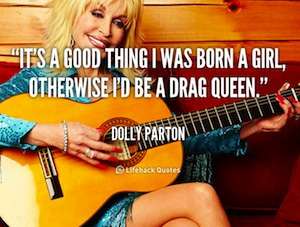The Hidden History of Queer Country Music
Ty Herndon and Billy Gilman aren't alone.

Pop-country star Ty Herndon, long rumored to be gay, finally came out of the closet this week. Another country singer, Billy Gilman, almost immediately followed suit. The double revelation is being hailed as big pop-culture news, and I suppose it is: There just aren't many openly gay musicians in mainstream country music. There's k.d. lang, but she left the genre long ago. There's Chely Wright, of "Bumper of My SUV" fame, but honestly, I'd forgotten she existed til I saw her mentioned in one of the stories about Herndon. The alternative-country world has more than a few gay performers, of course, but they aren't really mainstream. And then there's that time Willie Nelson kissed Charlie Pride on the mouth, but that wasn't about sexual attraction, or so they say.
But if the country middle is only barely bi-curious, the country margins have long had room for queer themes—and no, you don't have to go looking for esoteric meanings in the lyrics of "Bareback" or "Where Is My Sailor Boy?" to find them. Here is a brief and far-from-complete tour.
We'll start with Salty Holmes' band the Prairie Ramblers, which sometimes recorded novelty songs under a different name, the Sweet Violet Boys. In 1939, wearing their Sweet Violet hats, they released a catchy sequence of double entendres called "I Love My Fruit":
Billy Briggs' "The Sissy Song," from 1951, is a lot less good-natured:
Holmes and Briggs were straight guys (as far as I know), and their songs were aiming for laughs. But when Lavender Country released an entire album of gay country music in 1973, the band was genuinely out 'n' proud. (Except the dobro player. He was the token heterosexual.) They didn't get much airplay, and the airplay that they did get didn't always end happily—when the Seattle outlet KRAB played their song "Cryin' These Cocksucking Tears," the FCC slapped the station with a fine. (*) But the band sounded pretty good, sort of a queer northwestern version of the Flatlanders:
Lavender Country wasn't just genuinely gay; it was genuinely country. More often, if you heard honky-tonk music with gay-themed lyrics in the 1970s or '80s, you were listening to interlopers doing a Nashville pastiche. When Ned Sublette's "Cowboys Are Frequently, Secretly Fond of Each Other" came out in 1981, for example, it appeared on a poetry record, alongside not-so-country tracks by William Burroughs, Brion Gysin, and Amiri Baraka:
Similarly, the lesbian trio Two Nice Girls came out of the punk and "women's music" scenes, though they did a pretty good approximation of the Opry sound when they recorded this in 1989:
By the '90s and '00s, the genre had room for gay-focused niche acts like Doug Stevens & the Outband and the CowGirl Sweethearts. A few openly gay country musicians made bids for mainstream success in the Clinton years, though Nashville wasn't quite ready for that yet. And in 2006, Willie Nelson released his own version of "Cowboys Are Frequently, Secretly Fond of Each Other," which if nothing else showed that the margins and the middle were starting to meet.
Burt Reynolds has a cameo in Nelson's video. I assume he's there because he's macho in a kind of camp way and because he has that mustache, but maybe he just happened to be visiting Willie that day.
Bonus links: JD Doyle describes still more queer country songs here. Tiny Tim sings "I'm Gonna Be A Country Queen" here. A "collection of links to websites dedicated to gay and lesbian country western dance events, organizations, dance clubs, and dance classes" is here.
* Correction (8/3/2017): Chuck Reinsch, keeper of the invaluable KRAB Archive, writes to tell me that he doesn't think the story about KRAB is true:
I've been trying to run this down, as after going through Haley, Bader and Potts [KRAB's lawyers] files, and speaking with people that were on the board of directors, I cannot find any evidence that KRAB was ever fined by the FCC, or even cited for obscenity.
He's probably right. Back in the '90s, when I was writing my book Rebels on the Air, I spent a fair amount of time talking to old KRAB hands and going through those Haley, Bader & Potts files myself. But that's not where I heard the Lavender Country story; I picked it up from some press coverage of the band when their music was reissued a few years ago, and I assumed I'd either missed the tale the first time around or forgotten it. Apparently not.
So how did the rumor start? Reinsch has a theory:
I am aware of a KRAB volunteer who says she was visited by the FBI regarding the broadcast of the song, and, she says the agent confiscated her third class permit. Although I was not working at KRAB in 1973, I know who was there (now deceased), and suspect it likely that the "agent" was an imposter, who was employed to convince the volunteer of their wrong doing and "fire" them from the station.
If that's true, it's an even better story.


Show Comments (31)